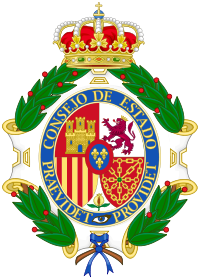- Spanish Council of State
-
The Spanish Council of State (Spanish: Consejo de Estado) is the supreme consultative council of the Spanish Government. The current Council of State was established in 1980 according to the article 107 of the Constitution of 1978. The institution of the Council of State, understood as supreme consultative council of the Government, has existed intermittently since 1812. During the Ancien Regime, the Council of State advised the king about international policy.
The Council of State as foreign affairs council (1522-1834)
It was established by Emperor Charles V and although it dealt primarily with international issues, its actual functions were ambiguous as its supreme goal was advising the monarch about the State in general. It has a great influence during the reigns of Charles V (and Philip II and later during the regency of Mariana of Austria (1665-1675). The reforms of Philip V (1700-1746) emptied its actual power, although Godoy wished to revive it in 1792. It was definitively abolished in 1834.
The Council of State as supreme consultative council of the Government (1812-today)
The Council of State has existed intermittently during 19th and 20th centuries. The Constitution of 1812 established it and obliged the Government to ask for advice in case of serious issues.
External links
(Spanish) Web of the Consejo de Estado
Categories:- Government of Spain
- Government stubs
Wikimedia Foundation. 2010.

